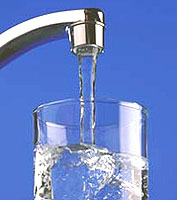
| Clean Drinking Water In Canadian Cities? | 3 July 15 |

In Canada, it is left to each province to decide how many tests each of its municipalities should do - a system Health Canada said makes sense based on which contaminants are relevant in any particular region. "They should be testing for everything, maybe not all the time, but at least on a periodic basis, rather than never testing for them at all," said Eva Pip, a University of Winnipeg professor specializing in water quality and toxicology. CBC asked 18 cities in every province and territory to provide a list of the health-related contaminants they test in their water supplies. Only one — Ottawa — tests for all 75 substances found in Health Canada's published guidelines for Canadian drinking water. Some cities, like Calgary, Edmonton and Halifax, test for all but one of the substances in the guidelines. Quebec City tests for 62, Regina 52, Winnipeg 49, St.John's 26 and Iqaluit just tests for 20.
View June 19, 2015 CBC News article |
|
 Print version Print version |
Top |
